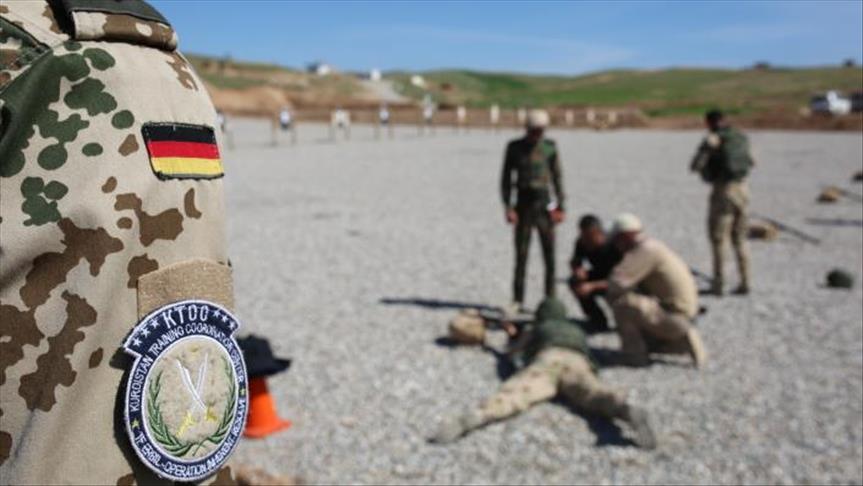 FILE PHOTO - Iraq's Kurdish Regional Government Peshmergas attend a military training exercise, conducted by US-led coalition forces' trainers at the Bnaslawa military training camp in Erbil, Iraq, 09 March 2016. Trainers from USA, UK, Netherlands, Hungary, Finland and Norway will be conduct 10 weeks long training for Peshmergas on usage of heavy and light weapons including anti-tanks, M6, M16, howitzers to fight against Daesh terrorists. ( Yunus Keleş - Anadolu Ajansı )
FILE PHOTO - Iraq's Kurdish Regional Government Peshmergas attend a military training exercise, conducted by US-led coalition forces' trainers at the Bnaslawa military training camp in Erbil, Iraq, 09 March 2016. Trainers from USA, UK, Netherlands, Hungary, Finland and Norway will be conduct 10 weeks long training for Peshmergas on usage of heavy and light weapons including anti-tanks, M6, M16, howitzers to fight against Daesh terrorists. ( Yunus Keleş - Anadolu Ajansı )
By Ayhan Simsek
BERLIN
Germany’s defense ministry said Monday there was no proof to back up claims that Peshmerga used German weapons in an attack in Kirkuk last week which killed two soldiers and wounded five others.
Defense ministry spokesman Jens Flosdorff told a news conference in Berlin they were investigating, but could not verify them by any official finding.
“Contrary to media reports, we have no indications that Peshmerga used MILAN anti-tank rockets there,” Flosdorff said, adding that weapons supplied to the Kurdish Regional Government (KRG) were only for the fight against Daesh, something which has also been assured by the Erbil government.
Flosdorff said claims on the misuse of German arms also appeared in the past and were taken seriously. He said contact had been made with both Iraq’s central government and with the KRG in Erbil to investigate.
Iraqi local media reported on Friday that Peshmerga used German weapons in clashes with government forces in Altun Kupri in Kirkuk, destroying a tank, killing two soldiers and wounding five others.
No effective control
Since 2014, Germany has supplied 60 MILAN anti-tank rocket launchers and more than a thousand MILAN rockets to Iraqi Kurdish militia, to support them in the fight against Daesh.
German military aid for Peshmerga also included 13,500 rifles, 4,000 pistols and more than 50 military vehicles.
Flosdorff said the KRG has given a commitment to Germany that these weapons would only be used against Daesh, and would not be transferred to any third party.
He acknowledged that Germany did not have the means to control these weapons on the ground, but relied on the commitments made by the regional government.
“We really have no reason to doubt that these agreements would be violated on a large scale,” he said.
Germany’s opposition parties have long been critical of the government’s decision to provide arms to the KRG, fearing these weapons could fall into the hands of terrorist groups, or could be used in a potential conflict with Erbil and the central government in Baghdad.
Meanwhile, the German defense ministry decided to resume its training of Kurdish Peshmerga forces in northern Iraq after a brief pause last week due to the tensions between Erbil and Baghdad.
Flosdorff said Defense Minister Ursula von der Leyen had telephone conversations with her U.S. counterpart, Iraqi Prime Minister Haider al-Abadi and KRG President Masoud Barzani, and had the impression that both sides wanted to de-escalate tensions.
Germany has been providing military training for Kurdish Peshmerga forces since 2015 to support the fight against Daesh in the region.
Around 150 German soldiers are stationed in Erbil, training to around 400 Peshmerga fighters.
Anadolu Agency website contains only a portion of the news stories offered to subscribers in the AA News Broadcasting System (HAS), and in summarized form. Please contact us for subscription options.







